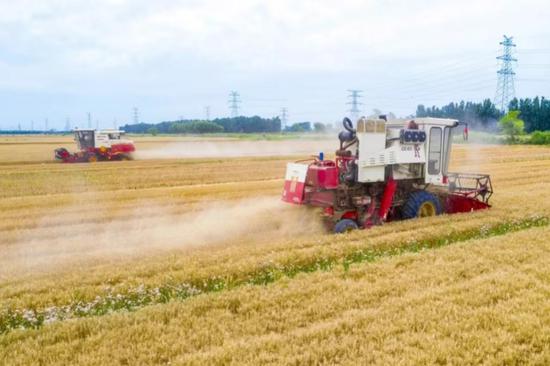Saline solutions transform barren land into fertile fields
In late October, a bustling scene is unfolding as harvesters and grain transportation vehicles move back and forth across 173 hectares of rice fields in Kenli district of Dongying, Shandong province.
"We are harvesting the salt-tolerant rice. We anticipate a good year," said Wang Xiaomeng, deputy general manager of Dongying Benlai Agricultural Technology Development Co.
"Our rice base benefits from an extended growing season, resulting in exceptionally fragrant and sticky rice that commands high demand in the market," Wang added.
Dongying cultivated over 14,666 hectares of rice in the Yellow River estuary area, data from 2023 shows, with Kenli district and Lijin county serving as primary cultivation areas. Kenli alone boasts a rice cultivation area of 10,000 hectares, solidifying rice's standing as a signature grain grown in the saline-alkali land.
Located in the Yellow River estuary where the waterway flows into the Bohai Sea, Dongying faces significant challenges with severe soil salinization. It has over 130,666 hectares of saline-alkali farmland, which represents about 60 percent of the city's total arable land.
Consequently, the transformation of saline-alkali lands into productive fields has become a central focus of Dongying's agricultural development strategy.
The city has been exploring innovative agricultural technologies to convert once barren soil into productive farmland. "Successful cultivation on saline-alkali lands requires a blend of high-quality seeds and advanced techniques," said Wei Lixing, head of the Dongying comprehensive experimental station, which is involved in the development of a provincial rice technology system.
Methods such as burying pipes underground to drain salt-contaminated water from the soil, and increased use of organic fertilizer have significantly enhanced soil quality and rice output on saline-alkali lands, said Wei.
To apply these methods to agricultural productivity, Dongying has established seven technical teams to focus on increasing production of major crops such as rice and soybeans.
These teams offer on-site assistance and training, ensuring the effective implementation of new technologies and innovations in the field, thereby increasing rice production.
At Dongying's agricultural high-tech industrial demonstration zone, soybeans are also set for a promising harvest.
"This variety is known for its large beans, with some plants producing up to 185 pods," Jin Zhendong, a researcher at the demonstration zone said, while holding a cluster of bean pods in his hand, with each pod containing three plump beans.
Despite the soybean plants being shorter than in previous years due to heavy rainfall, he remains optimistic about the yields they will produce.
Thanks to a series of work projects on cultivating salt-tolerant seeds and improving soil quality, what was once barren saline-alkali land has been transformed into fertile fields in Dongying. By the end of 2025, Dongying aims to transform 2,320 hectares of barren saline-alkali land into new arable land.

